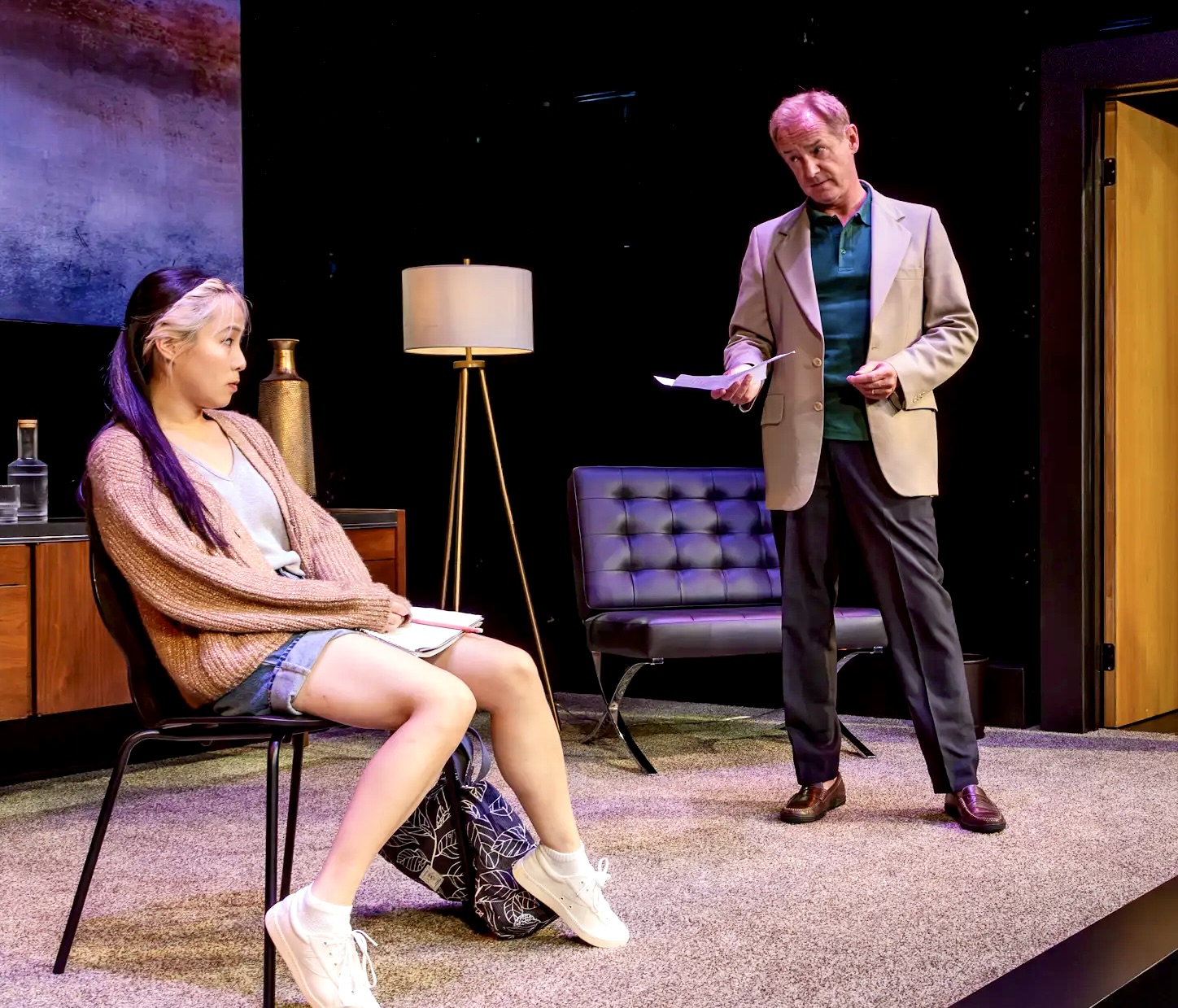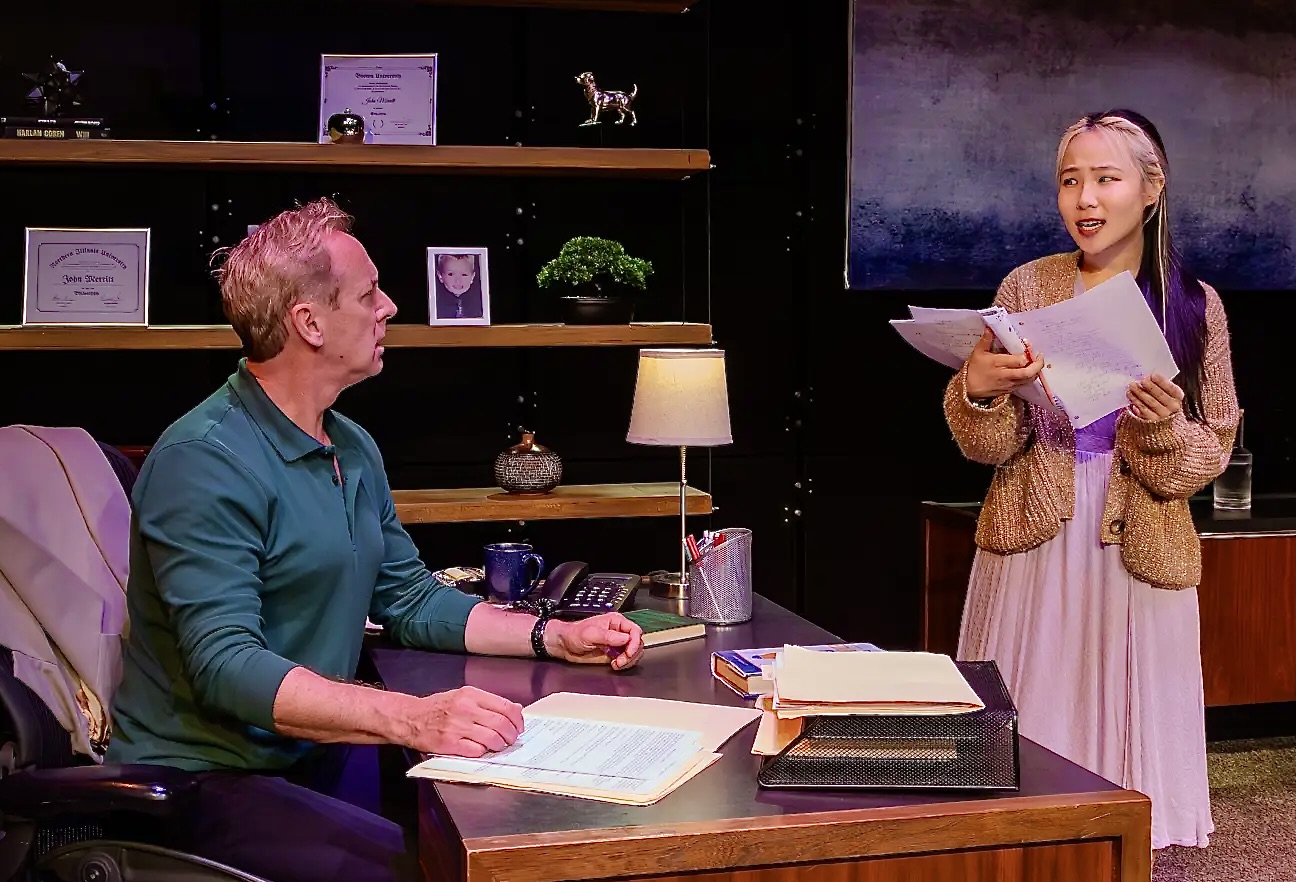Acts of Creation and Negation: ‘Oleanna’ at Kinetic

The course material is weird and student Carol (Mei Lu Barnum, L) doesn’t get it. Will professor John (David Whalen) lead or mislead her in ‘Oleanna’?
You can see the man setting a trap for himself in the very first scene. He’s one of two characters in Oleanna, now being staged by Kinetic Theatre of Pittsburgh, through July 28. This cage match of a drama was controversial when it premiered in 1992 and supposedly remains relevant today, due to the subject matter. On the surface, it’s about allegations of sexual harassment and oppression.
But what if Oleanna is also about—perhaps even “really” about—something deeper, something more? This reviewer suspects that it is. And that Kinetic’s production, a strong one, is worth seeing for reasons beyond those you’d normally hear.
A King and a Supplicant
The story is fictional, set in the office of a college professor named John (played by David Whalen). When the lights come up on him, John is exuberant. He has learned he’ll be granted tenure, a big deal in the academic world. He’s on the phone hashing out details to close on a new house for his family. His call is interrupted when a student shows up at the office door.
The young woman, Carol (Mei Lu Barnum), approaches like a peasant groveling at the throne of a king. Hunched over and painfully self-conscious, she manages to say that she just cannot understand the professor’s course. She has read the assigned book—one that John himself wrote—and seems terrified that she can’t fathom it. Her latest paper got poor marks and she’s afraid she will fail.
Good thing she caught the prof on a happy day! John, oozing benevolence, promptly sets out to reassure the poor girl. He confides that he too once felt like a failure. Then he proceeds to do several things that he shouldn’t have. He tells Carol he will give her a break because he likes her. He says he will even guarantee an A in the course if she comes back for more coaching visits. To illustrate a point in the book, he tells a silly sex joke, which falls flat. When Carol still looks distraught, he tries to place a comforting hand on her shoulder. And then the phone rings and he’s off to answer it …
Next scene, some days later, same office, with the roles now reversed. Mousy Carol seems transformed. Dressed to kill, and speaking incisive language she’s apparently learned from an unnamed “group” she has joined, she brandishes a list of harassment complaints against John. She has filed them with the tenure committee, putting his future in danger. The professor, dumbfounded, is now the person fumbling to understand. But there will be no rapprochement. Through this scene and the next, fireworks escalate to a finale that leaves both parties harmed.

He said it, he did it, and she has it in her notes. Now Carol puts John through the wringer.
Problems
In a certain sense Oleanna feels dated. These days, as opposed to in 1992, only a fool or a diehard predator would behave as John did during Carol’s first visit. Yet fools and diehard predators persist, often in high places, so in that respect the play holds relevance.
A greater concern is that the tensions between the characters feel unbalanced. Ideally we’d be left wondering who was right, who was wrong, and who’s to blame, but that was not the case for me. Nor was it the case for people I spoke with who saw the play at Kinetic, including a female friend who is staunchly feminist. In her view, John came across as a naive but good-natured fellow caught in a buzzsaw, while Carol came across as an outright unlikable young woman—a person who shifts from sniveling to arrogance, seizing upon and exaggerating minor missteps, sowing havoc out of spite.
My friend’s conclusion: probably just another case of misogyny from playwright Mamet. He had to write the woman as a bitch, didn’t he?
Maybe so. But I saw more in the play, which words can only hint at. Let me try to at least suggest what I saw.
What Lurks Beneath
Oleanna has a recurring subtheme, brought out largely in back-and-forth comments about the professor’s book. John wrote (and is proud to have written) a book that mocks and criticizes the entire system of higher education. He has called it a scheme for “virtual warehousing of the young,” which, among other sins, subjects them to “prolonged and systematic hazing.” To sum up bluntly, he describes a meaningless system full of bureaucratic bullshit.
That’s the stuff Carol could not grasp at first. And later, in her arrogantly enlightened state, she’s quick to call out John as a hypocrite. Hasn’t he profited from—and gained power and privilege from—the very system his book condemns?
Well, one could put it that way. But isn’t that also why John offered to put aside the bullshit of rules and grades, granting an A to a student who was curious enough to inquire?
And there is more, more irony galore, in this hall-of-mirrors subtheme. During the play’s first scene, while John is loftily trying to outline his “theory of education,” Carol cuts in with “I want to know about my grade.” Turns out she is after a credential that will get her into graduate school, where grander credentials await. She wants a piece of the system, not a critique of it.
Will accusing her professor of harassment help her achieve this? Unsure. But it surely does turn the tables. In fact it flips the table upside down, a power move in its own right—and a move that sets the stage for bargaining. Eventually Carol says she and her group will withdraw their complaints if John takes conciliatory steps. A key one is to have his book struck from the college reading list, and at this proposal, John explodes. The book is his life’s work, his ultimate creation! Censoring it, negating it, is unthinkable!
Even though—and this is where a reviewer’s words start to falter—even though his creation is itself an act of negation.
In a perfect world, women, men, and persons of other genders would work together to create and build. Oleanna presents a world where that perfection feels impossibly out of reach. It’s a world of tear-down. Maybe, in that sense, like our current world today? And maybe relevant for that reason, or something like it?
See Oleanna. Lightweight summer viewing it isn’t. But it’s powerfully acted and presented. See it and see what you think.
Closing Credits and Ticket Info
David Mamet’s Oleanna is directed for Kinetic Theatre by Andrew Paul, the company’s producing artistic director. Through July 28 in the Richard Rauh Studio Theatre in the basement (Level B) of the Cathedral of Learning, 4200 Fifth Ave., Oakland. Visit Kinetic on the web for tickets.
Scenic design is by Jonmichael Bohach, with lighting by Annmarie Duggan, sound by Mark Whitehead, costumes by Harumi Hirata, and properties by Alex Keplar. The technical director is J.C. Bardzil and the production stage manager is Deborah Heyl. Fine work is done by all.
Photos: Rocky Raco.
Mike Vargo, a Pittsburgh-based freelance writer, covers theater and other topics for Entertainment Central.
Share on Social Media
Follow Entertainment Central
Latest Stories
Sign up for the EC Newsletter







